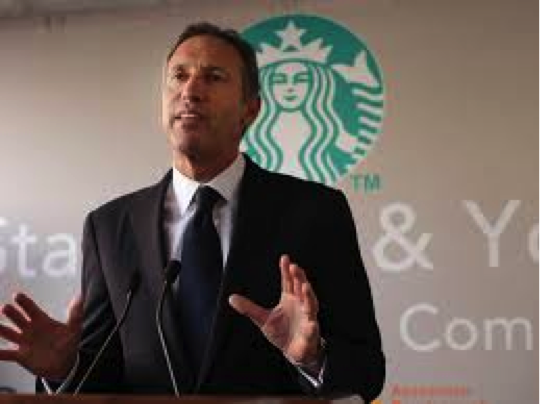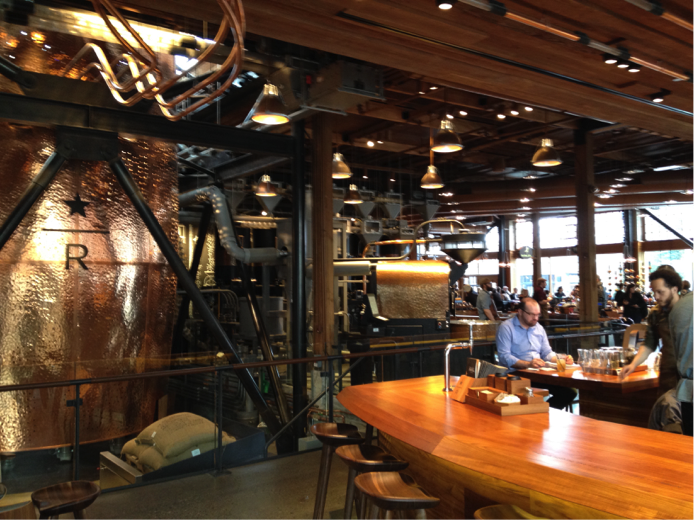The great Danish writer, Isak Dinesen, is frequently cited for saying, “Coffee, according to the women of Denmark, is to the body what the Word of the Lord is to the soul.” I can’t speak directly to what the women of Denmark want or need, but coffee is certainly a key element for me in Surviving Seattle.
This week, at the Starbucks annual shareholders meeting, CEO Howard Schultz shared some brain-cramping bits of information. After announcing that there would be a 2 for 1 stock split based on the company’s record earnings, he dropped some remarkable statistics about the company’s performance. Did you know, for instance, that Starbucks baristas prepare an astounding 7,000 handcrafted beverages every minute of every day or that the worldwide company plans to open a new store every six hours in 2015? I find it almost impossible to wrap my head around these numbers even though I live in the eye of the international coffee storm.
In spite of the company’s remarkable performance and the fact that it’s a hometown company I don’t feel a lot of affection for the brand or Mr. Schultz. The coffee tastes bitter (Charbucks?) to me, the pastries are small, overpriced and sugary, and until recently Mr. Schultz has been arrogant and uninvolved as a corporate leader in Seattle’s civic affairs. In 1991 he fought with and sued his residential neighbors and then in 2006, after owning the NBA Seattle Sonics for five short years, he sold them down the river to a bunch of oil-rich Oklahomans who spirited the team away to Oak City. Some people here will never forgive him no matter how much money he spreads around or how many jobs he creates
On the plus side, he‘s done some good things for and with his company. Under pressure from outside critics he began promoting and implementing Fair Trade practices in the coffee industry and working to improve environmental and working conditions for plantation workers. At the same time, he bucked Wall Street by providing above minimum wage compensation and giving even part-time workers healthcare and 401k benefits. Recently he accommodated workers by designing a scheduling algorhithm that gave them more predictability in organizing their work lives. In the last three years he’s also been outspoken in the national debates over government gridlock and gun rights. Not all bad to be sure.
One of the new and innovative things Mr. Schultz and Starbucks have done locally is to open a 15,000 square foot roaster and café in downtown Seattle. M and I dropped by last week. It’s hard not to be impressed.
This place is part shiny industrial chic and part Willy Wonka Chocolate Factory. Earlier remarks notwithstanding, the food and beverage offerings here are first class. I tasted two drip coffees – Pantheon and Amazonas Pure – that were flavorful and smooth while eating a “Loaded Baked Potato” scone with soft butter that I would happily repeat every morning for the rest of my life. The Roastery is a showplace but more than that it speaks to the company’s commitment to quality. The everyday offerings in neighborhood stores may leave something wanting but this large scale experiment, contrary to the direction of other national chains, is toward quality not away from it.
There is something both inspiring and distasteful about successful people sharing their opinions on subjects not in their wheelhouse. I don’t know if it’s hubris that makes them believe their opinions matter to others or whether it’s a sincere desire to be a positive force for good? Maybe it’s both. In spite of the good news Mr. Schultz delivered to shareholders, the biggest headline from the shareholders meeting had to do with a new company effort called Race Together, a much-criticized attempt to provoke conversation about race relations. The “Race Together” caption, written on Starbucks take-out cups, revealed itself to be a bumbling, clumsy way to open a dialogue on race. I, personally, don’t want to engage with my barista on the race issue, and Gwen Ifill of the PBS Newshour tweeted, “Honest to God, if you start to engage me in a race conversation before I’ve had my morning coffee it’s not going to end well.” The Starbucks strategy is not clear or well thought out but as clumsy as it is I think it’s courageous. With all that has occurred across the country in the last year, I applaud Mr. Schultz for attempting to bring the issue forward. Maybe we latte-swilling white folks need to stop pretending it’s someone else’s problem.
I sincerely hope that events of the recent past will result in positive changes across the country. There’s enough race-baiting and name calling to go around these days. We don’t need more. What we need are people, especially business and civic leaders, with the courage to address the subject, participate in the debate, and work on solutions.
Thanks, Howard. Now, how about getting us back our NBA franchise? Winning the NBA title is like developing a strong brand and successful business. It takes time. In 2000 you turned the CEO duties at Starbucks over to others but in 2008 you took over again in the face of a company downturn. Now you’re on top again. Maybe you could redeem yourself with basketball fans by supporting the effort to bring a team back to Seattle. What do you think?

































